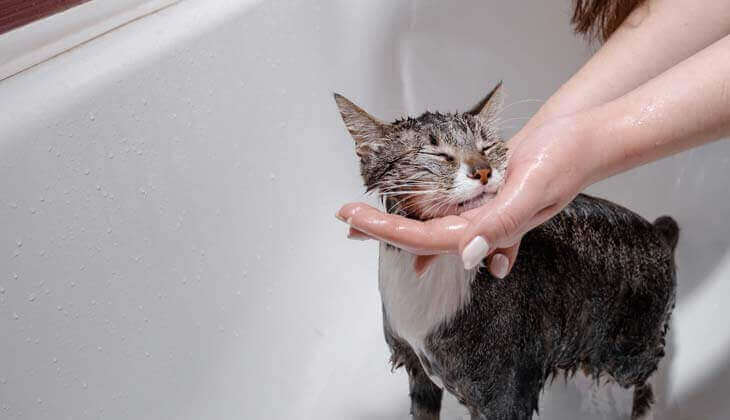As cat owners, we all know how fastidious our precious felines are about keeping themselves well-groomed and because of this, many of us may be under the impression that they don’t need to be bathed. It turns out, this is one of the many myths that are floating around about cats and grooming. So let’s unravel these misconceptions to better understand what our beloved kitties really need.
DO I NEED TO BRUSH MY CAT?
Your domestic cat spends at least 15 percent of each day grooming, so you may also assume your cat doesn’t need brushing. Brushing your kitty actually provides a wonderful bonding opportunity for you and your feline, in addition to a number of benefits.
Brushing your cat helps to remove dirt, grease and dead hair and improve the overall condition of the skin. Weekly brushing also stimulates blood circulation and regular removal of hair can reduce shedding.
Long-haired cats – require daily brushing to prevent matting and to help remove dirt and manage shedding.
Hairless cats – don’t require brushing but they do need weekly baths to help manage oil buildup. Between baths, you can use a wet washcloth or baby wipe to help to maintain skin hygiene.

DO CATS NEED BATHS?
Given your feline friend’s grooming habits it’s also easy to see why you might assume that they don’t really need to be bathed.
If your cat is elderly, obese or has mobility issues, he or she may need your help in keeping his or her body clean. If your cat has got particularly dirty, he or she may benefit from a bath.
If you’re feeling hesitant about giving your cat a bath, here are some tips on how to do this successfully:
- Be prepared. Choose a quiet, safe place for the bath, such as a bathroom. Make sure the water in your kitty’s tub is shallow – it should just reach the bottom of your cat’s chest. Make sure you avoid getting products on his or her face.
- Brush before bath. If your cat is uncomfortable with being brushed and/or bathed, try separating the two tasks with a little break, or even a treat.
- Rinse! Make sure you rinse your kitty thoroughly.

ARE CATS REALLY AFRAID OF WATER?
While this myth has long been perpetuated, you may have seen your cat playing with water as it runs or drips out of a tap. And there are some breeds of cats that actually enjoy the occasional swim. These breeds include the Maine Coon, Bengal and Turkish Van. In fact, scientists believe that some cats’ aversion to water has to do with the nature of their fur, which takes a long time to dry. Wet fur is extremely uncomfortable, and it takes a long time to dry. Wet fur is also heavier than dry fur and it makes your cat less nimble, slower on the go, and that impacts his or her natural instinct to run when feeling threatened.
When you are trying to bathe your cat, use treats and a calm voice to comfort him or her.
WHAT OTHER GROOMING NEEDS DOES MY CAT HAVE?
Brushing Teeth. Some people might think it’s silly to brush your cat’s teeth, but this is yet another myth that is completely untrue. The fact is that like humans, regular tooth brushing freshens breath and limits the risk of oral disease in your cat. Also, when you spend the time brushing your cat’s teeth, it helps you notice anything unusual or different in your cat’s mouth and gums.
Ear care. Check your kitty’s ears once a week and look for signs of wax and/or debris or anything unusual.
Paw and nail care. Regularly examine your cat’s paws and nails for wounds.
Eye care. Giving your cat a quick eye check will help you notice if there is a difference in the condition of your cat’s eyes, such as cloudiness or tearing.
If you’re not comfortable bathing or grooming your cat yourself, talk to your veterinarian about the best strategies or seek help from a professional groomer. And if you really want to debunk any myth about your favourite feline, you can always ask your veterinarian.
Looking for a Vet?
Your veterinarian plays a big role in your pet’s health. Input your location information and get a list of veterinarians near you.
Find A Vet Near Me





 Go To United States
Go To United States Austria
Austria Belgium
Belgium Czech Republic
Czech Republic Denmark
Denmark Europe
Europe Finland
Finland France
France Germany
Germany Greece
Greece Hungary
Hungary Ireland
Ireland Israel
Israel Italy
Italy Netherlands
Netherlands Norway
Norway Philippines
Philippines Poland
Poland Portugal
Portugal Romania
Romania Saudi Arabia
Saudi Arabia Slovakia
Slovakia South Africa
South Africa Spain
Spain Sweden
Sweden Switzerland
Switzerland Turkey
Turkey United Kingdom
United Kingdom